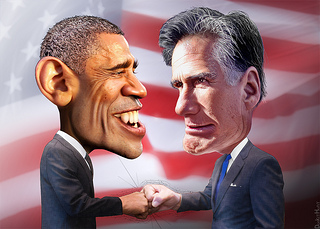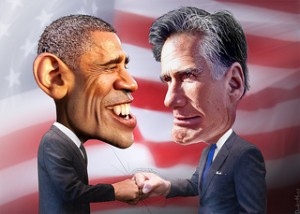Political Ads, Spanish-Language TV and the Latino Vote

 By Joseph Torres and Josh Stearns, New America Media
By Joseph Torres and Josh Stearns, New America Media
Latino voters will play a critical role in the 2012 presidential race. An estimated 12 million Latinos will cast ballots this November, making up a significant portion of the electorate in swing states like Colorado, Florida and Nevada.
One might assume that the presidential candidates, political parties and Super PACs would spare no expense to win over Latino voters. After all, Latinos make up 17 percent of the U.S. population. But so far, that has not been the case.
While analysts project that more than $3 billion will be spent on political ads this year, a relatively paltry amount has been spent on Spanish-language ads. This is particularly the case when it comes to ad spending by Super PACs and other third-party groups.
 A new Free Press report, “Missing Out: Political Ads, Spanish-Language TV and the Latino Vote,” studied ad spending in the battleground states of Colorado, Florida and New Mexico. We found that outside groups bought very few political ads at the 11 Spanish-language stations we visited in these three states.
A new Free Press report, “Missing Out: Political Ads, Spanish-Language TV and the Latino Vote,” studied ad spending in the battleground states of Colorado, Florida and New Mexico. We found that outside groups bought very few political ads at the 11 Spanish-language stations we visited in these three states.
Free Press staff traveled to Albuquerque, Colorado Springs, Denver and Miami in August and September, visiting Univision, Telemundo, Telefurtura and other Spanish-language broadcasters. We were there to examine the stations’ political files, which contain information on who is behind all those political ads flooding our airwaves, and how much they are spending. We had to visit those outlets in person because the Federal Communications Commission’s new online database of political ad data does not include information from Spanish-language stations, which do not need to post their files until 2014.
We found that the presidential campaigns made some ad buys at the 11 stations we visited. But there was very little spending from third-party groups, except for the Service Employees International Union.
The SEIU spent more than $450,000 to run 2,079 ads on five Spanish-language TV stations in Denver and Colorado Springs from July through September. To put that in perspective, a Free Press report released in October found that the five major Super PACs spent more than $6.5 million to air close to 5,000 political ads on English-language stations in Denver in August and September.
And a study released last month from the U.S. Hispanic Chamber of Commerce reported that close to $360 million was spent on political advertising in 10 states from early April through September, but just $16 million — or 4.6 percent of the total — went to ad buys on Spanish-language TV.
While we believe broadcasters should not allow false or misleading ads on their airwaves, what we know about political ads on Spanish-language stations raises a different — but equally significant — set of questions. Is the Latino community better off with fewer political ads given how many are misleading? Or does the dearth of political ad spending harm the Latino community?
Professor Federico Subervi, the director of the Center for the Study of Latino Media and Markets at Texas State University-San Marcos, noted the importance of using Spanish-language advertising to engage Latino voters. “It can have a positive effect of saying we’re considered a valuable group of potential voters,” Subervi said.
Meanwhile, Sylvia Manzano, a senior analyst at the political opinion research firm Latino Decisions, noted “[It’s] not a good thing that Latino voters aren’t being approached in as many ways as possible.” Latinos see ethnic advertising, she added, as a “gesture of goodwill.”
Latino Print Network President Kirk Whisler provided an additional perspective. He criticized both the Obama and Romney campaigns for failing to appreciate the value of using Hispanic print publications to reach Latino voters. “I don’t think either the Romney people or the Obama people have a true understanding of the Hispanic community in the first place,” Whisler said, “let alone of the importance of Hispanic print.”
The question remains: Do political TV ads serve the best interests of the Latino community? National Institute for Latino Policy President Angelo Falcon isn’t so sure, citing the predominance of negative ads — and the general failure in political advertising to address substantive issues.
For Falcon, the lack of political advertising on Spanish-language TV reflects a broader socioeconomic problem. Latinos, Falcon said, lack the financial resources to fully engage in the political process. The Citizens United decision, he noted, has allowed “political inequality” to “fester.” This reveals the need, Falcon notes, for reform efforts like public financing of elections.
Andrea Quijada, executive director of Albuquerque’s Media Literacy Project, is concerned that the Latino community often does not have enough information to place an ad’s message in its proper context.
“If the only information people are getting about the campaign is through the ads, that’s damaging … that’s true for any community,” Quijada said. “Anytime we are advertised to for anything … and there isn’t other information out there, it has the potential to … create misinformation and misunderstanding, whether or not the product is food or the product is a candidate.”
Given the nation’s changing demographics, it’s hard to imagine that political campaigns and third-party groups won’t ultimately devote more financial resources to winning the Latino vote. While many Latino leaders believe more Spanish-language ads are critical to engaging Latino voters, some may have second thoughts once viewers are inundated with political ads.
In other words, an increase in the number of political ads may not turn out to be a blessing. “It is great to be validated,” said Quijada. “It is disappointing if that is only happening through advertising.”
This article was first published in New America Media.
Free Press is a nonpartisan organization building a nationwide movement for media that serve the public interest. Joseph Torres is the group’s senior external affairs director. Josh Stearns is the organization’s journalism and public media campaign director.

